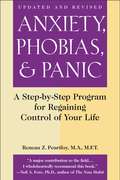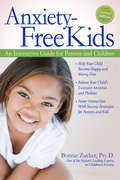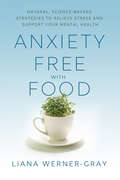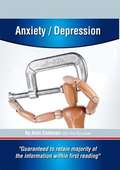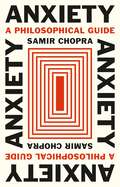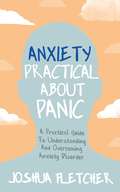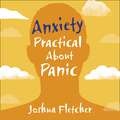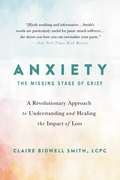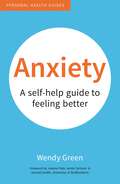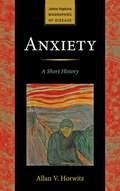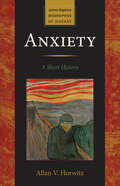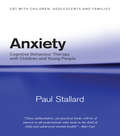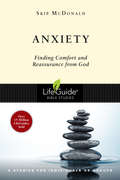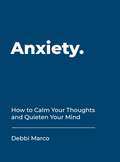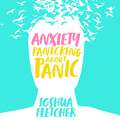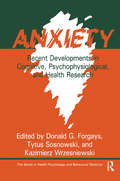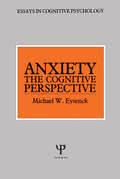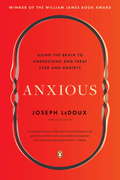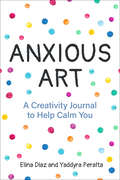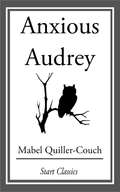- Table View
- List View
Anxiety, Phobias, and Panic: A Step-by-Step Guide for Regaining Control of Your Life
by Reneau Z. PeurifoyIn this classic guide, expert Reneau Peurifoy shows readers how to understand and overcome all types of anxiety-related disorders. Anxiety is an unpleasant, though mostly unavoidable, aspect of modern life-but for many, normal anxiety can become something far more serious and debilitating. Now, in this updated and revised edition of Anxiety, Phobias & Panic, readers will learn how their condition developed and how to overcome their anxiety-related problems. Areas covered include: uncovering the causes of anxiety, building stress tolerance, identifying and correcting harmful modes of thinking, relaxation techniques, tools for managing anxiety, and much more.
Anxiety, Stress, and PTSD
by Stephen M. Stahl Meghan M. GradyThe Stahl's Illustrated books are a series of pocket-sized, mid-priced, themed volumes. They distil theoretical information from the Stahl's Essential Psychopharmacology volume and combine this with practical data from The Prescriber's Guide. They are illustration heavy and designed to encourage speedy learning of both concepts and applications. The visual learner will find that these books make the concepts easier to master, and the non-visual learner will appreciate the clear, shortened text on complex psychopharmacological concepts. This volume covers the latest developments in our understanding of post-traumatic stress disorder and anxiety. As well as covering the full range of management options, there is a specific focus on the implications for military populations. The Stahl's Illustrated series appeals to the widest possible audience of mental health professionals, and not just those with expertise in psychopharmacology.
Anxiety-Free Kids: An Interactive Guide for Parents and Children
by Bonnie ZuckerAnxiety-Free Kids (2nd ed.) offers parents strategies that help children become happy and worry free, methods that relieve a child's excessive anxieties and phobias, and tools for fostering interaction and family-oriented solutions. Using a unique companion approach that offers two books in one-a practical, reader-friendly book for parents and a fun workbook for kids-this solutions-oriented guide utilizes the cognitive-behavioral approach to therapy and integrates the parent in the child's self-help process. Research has shown that if left untreated, children with anxiety disorders are at higher risk to perform poorly in school, to have less-developed social skills, and to be more vulnerable to substance abuse. Covering the six most commonly occurring anxiety disorders-generalized anxiety, separation anxiety, specific phobias, social phobias, panic disorder, and obsessive-compulsive disorder-this book gives kids and parents successful strategies for achieving relaxation, conquering worries, challenging faulty thinking patterns, developing positive self-talk, and facing one's fears.
Anxiety-Free Kids: An Interactive Guide for Parents and Children
by Bonnie ZuckerAnxiety-Free Kids (2nd ed.) offers parents strategies that help children become happy and worry-free, methods that relieve a child's excessive anxieties and phobias, and tools for fostering interaction and family-oriented solutions. Using a unique companion approach that offers two books in one—a practical, reader-friendly book for parents and a fun workbook for kids—this solutions-oriented guide utilizes the cognitive-behavioral approach to therapy and integrates the parent in the child's self-help process.Research has shown that if left untreated, children with anxiety disorders are at higher risk to perform poorly in school, to have less-developed social skills, and to be more vulnerable to substance abuse. Covering the six most commonly occurring anxiety disorders—generalized anxiety, separation anxiety, specific phobias, social phobias, panic disorder, and obsessive-compulsive disorder—this book gives kids and parents successful strategies for achieving relaxation, conquering worries, challenging faulty thinking patterns, developing positive self-talk, and facing one's fears.Educational Resource
Anxiety-Free with Food: Natural, Science-Backed Strategies to Relieve Stress and Support Your Mental Health
by Liana Werner-Gray&“Liana&’s recipes are packed with antioxidants, magnesium, and healthy omega fats to help reduce stress and defeat anxiety.&” — Mark Hyman, M.D., New York Times best-selling author of Food: What the Heck Should I Eat?Release stress and anxiety naturally with this simple yet comprehensive nutrition guide that supports your mental health from Liana Werner-Gray, author of Cancer-Free with Food.Eat your way to calm . . .If you're feeling anxious, stressed, or depressed, you're not alone. The world may be in turmoil-but inside, we can feel unwavering peace. We can support our mental and physical health by avoiding anxiety-inducing ingredients and choosing foods and supplements that support our microbiome, address nutritional deficiencies, and balance our hormones.Liana Werner-Gray, nutritionist and author of The Earth Diet and Cancer-Free with Food, offers this simple guide to all the scientifically backed, nutrient-rich foods and supplements you need to support your emotional wellness. She offers 100+ delicious gluten-free, soy-free, refined sugar-free, and dairy-free recipes that both nourish the body and support optimal brain function. With Liana's easy strategies based on nutritional neuroscience, you'll feel empowered to take control of your mental well-being.Remember, life is meant to be enjoyed. Let your first step toward an anxiety-free life start with your next meal!
Anxiety/Depression
by Alan Eastman Ron NurwisahAddressing areas of everyday life-from the anxiety of visiting the dentist to personal depression-this guide helps listeners eliminate the prohibitive nature of fear and sadness. Incorporating such techniques as visual meditation and self-recorded transcripts to listen to while sleeping, listeners learn to gain control over their negative thoughts and feelings and conquer the paralyzing and unhealthy symptoms associated with anxiety and depression.
Anxiety: A Philosophical Guide (Moral Psychology Of The Emotions Ser.)
by Samir ChopraHow philosophy can teach us to be less anxious about being anxious by understanding that it&’s an essential part of being humanToday, anxiety is usually thought of as a pathology, the most diagnosed and medicated of all psychological disorders. But anxiety isn&’t always or only a medical condition. Indeed, many philosophers argue that anxiety is a normal, even essential, part of being human, and that coming to terms with this fact is potentially transformative, allowing us to live more meaningful lives by giving us a richer understanding of ourselves. In Anxiety, Samir Chopra explores valuable insights about anxiety offered by ancient and modern philosophies—Buddhism, existentialism, psychoanalysis, and critical theory. Blending memoir and philosophy, he also tells how serious anxiety has affected his own life—and how philosophy has helped him cope with it.Chopra shows that many philosophers—including the Buddha, Kierkegaard, Nietzsche, Freud, and Heidegger—have viewed anxiety as an inevitable human response to existence: to be is to be anxious. Drawing on Karl Marx and Herbert Marcuse, Chopra examines how poverty and other material conditions can make anxiety worse, but he emphasizes that not even the rich can escape it. Nor can the medicated. Inseparable from the human condition, anxiety is indispensable for grasping it. Philosophy may not be able to cure anxiety but, by leading us to greater self-knowledge and self-acceptance, it may be able to make us less anxious about being anxious.Personal, poignant, and hopeful, Anxiety is a book for anyone who is curious about rethinking anxiety and learning why it might be a source not only of suffering but of insight.
Anxiety: A Practical Guide to Understanding and Overcoming Anxiety Disorder
by Joshua FletcherDo you suffer from anxiety and panic? So did Joshua Fletcher, the author of the self-published bestseller ANXIETY: PANICKING ABOUT PANIC - but he treated his own condition successfully, went back to school, became a counsellor and emerged as one of the country's leading experts. ANXIETY: PRACTICAL ABOUT PANIC is a complete, easy to read and hugely practical book about anxiety from someone who knows how to recover and live your life to the full - and will show you how. Concentrating on the actions that you can take to alleviate and overcome your worries, this book is all about you and what you need to do to improve your life.
Anxiety: A Practical Guide to Understanding and Overcoming Anxiety Disorder
by Joshua FletcherDo you suffer from anxiety and panic? So did Joshua Fletcher, the author of the self-published bestseller ANXIETY: PANICKING ABOUT PANIC - but he treated his own condition successfully, went back to school, became a counsellor and emerged as one of the country's leading experts. ANXIETY: PRACTICAL ABOUT PANIC is a complete, easy to read and hugely practical book about anxiety from someone who knows how to recover and live your life to the full - and will show you how. Concentrating on the actions that you can take to alleviate and overcome your worries, this book is all about you and what you need to do to improve your life.
Anxiety: A Practical Guide to Understanding and Overcoming Anxiety Disorder
by Joshua FletcherDo you suffer from anxiety and panic? So did Joshua Fletcher, the author of the self-published bestseller ANXIETY: PANICKING ABOUT PANIC - but he treated his own condition successfully, went back to school, became a counsellor and emerged as one of the country's leading experts. ANXIETY: PRACTICAL ABOUT PANIC is a complete, easy to read and hugely practical book about anxiety from someone who knows how to recover and live your life to the full - and will show you how. Concentrating on the actions that you can take to alleviate and overcome your worries, this book is all about you and what you need to do to improve your life.(P) 2019 Hodder & Stoughton Ltd
Anxiety: A Revolutionary Approach to Understanding and Healing the Impact of Loss
by Claire Bidwell SmithA groundbreaking book exploring the little-known yet critical connections between anxiety and grief, with practical strategies for healing, following the renowned Kübler-Ross stages modelAnxiety disorders are on the rise; many people are looking for resources to help them cope with anxiety, yet most people aren't aware that unresolved grief is a primary underpinning--or that the two are related at all. In her therapy practice and in her own life, Claire Bidwell Smith discovered the connections between anxiety and grief. Now, backed by research, case studies, and interviews, Bidwell Smith breaks down the physiology of anxiety, giving readers a concrete foundation of understanding in order to help them heal the anxiety caused by loss. Taking a big step beyond Elisabeth Kübler-Ross' widely accepted five stages, Anxiety: The Missing Stage of Grief explains the intimate connection between death and grief and how they specifically cause anxiety--unpacking everything from our age-old fears about mortality to the bare vulnerability a loss can make us feel.With concrete tools and coping strategies for panic attacks, getting a handle on anxious thoughts, and more, Bidwell Smith bridges these two emotions in a way that is deeply empathetic and eminently practical.
Anxiety: A Self-Help Guide to Feeling Better (50 Things Ser.)
by Wendy GreenIn Anxiety: A Self-Help Guide to Feeling Better, Wendy Green explains how psychological, genetic and dietary factors can contribute to anxiety and offers practical advice and a holistic approach to help you deal with the symptoms, including simple dietary and lifestyle changes and DIY complementary therapies.
Anxiety: A Short History
by Allan V. HorwitzMore people today report feeling anxious than ever before—even while living in relatively safe and prosperous modern societies. Almost one in five people experiences an anxiety disorder each year, and more than a quarter of the population admits to an anxiety condition at some point in their lives. Here Allan V. Horwitz, a sociologist of mental illness and mental health, narrates how this condition has been experienced, understood, and treated through the ages—from Hippocrates, through Freud, to today. Anxiety is rooted in an ancient part of the brain, and our ability to be anxious is inherited from species far more ancient than humans. Anxiety is often adaptive: it enables us to respond to threats. But when normal fear yields to what psychiatry categorizes as anxiety disorders, it becomes maladaptive. As Horwitz explores the history and multiple identities of anxiety—melancholia, nerves, neuroses, phobias, and so on—it becomes clear that every age has had its own anxieties and that culture plays a role in shaping how anxiety is expressed. -- Peter Conrad, Brandeis University
Anxiety: A Short History (Johns Hopkins Biographies of Disease)
by Allan V. HorwitzFears, phobias, neuroses, and anxiety disorders from ancient times to the present.More people today report feeling anxious than ever before—even while living in relatively safe and prosperous modern societies. Almost one in five people experiences an anxiety disorder each year, and more than a quarter of the population admits to an anxiety condition at some point in their lives. Here Allan V. Horwitz, a sociologist of mental illness and mental health, narrates how this condition has been experienced, understood, and treated through the ages—from Hippocrates, through Freud, to today.Anxiety is rooted in an ancient part of the brain, and our ability to be anxious is inherited from species far more ancient than humans. Anxiety is often adaptive: it enables us to respond to threats. But when normal fear yields to what psychiatry categorizes as anxiety disorders, it becomes maladaptive. As Horwitz explores the history and multiple identities of anxiety—melancholia, nerves, neuroses, phobias, and so on—it becomes clear that every age has had its own anxieties and that culture plays a role in shaping how anxiety is expressed.
Anxiety: A Troubleshooting Guide for Parents (The Everything Healthy Living Series)
by Adams MediaYou want to provide the best for your children, but sometimes you can’t do it alone. If your child has been diagnosed with a serious medical condition, you may be overwhelmed with the challenges ahead. The Everything Healthy Living Series is here to help. These concise, thoughtful guides offer the expert advice and the latest medical information you need to understand your child’s condition and provide the best possible care.Inside you’ll find expert advice and helpful tips on recognizing when a healthy worry becomes an area of concern, understanding the causes of anxiety, seeking professional help, and treatment options, along with thoughtful suggestions on helping your child cope with anxiety.
Anxiety: A troubleshooting guide for parents
by Adams MediaYou want to provide the best for your children, but sometimes you can't do it alone. If your child has been diagnosed with a serious medical condition, you may be overwhelmed with the challenges ahead. The Everything Healthy Living Series is here to help. These concise, thoughtful guides offer the expert advice and the latest medical information you need to understand your child's condition and provide the best possible care. Inside you'll find expert advice and helpful tips on recognizing when a healthy worry becomes an area of concern, understanding the causes of anxiety, seeking professional help, and treatment options, along with thoughtful suggestions on helping your child cope with anxiety.
Anxiety: Cognitive Behaviour Therapy with Children and Young People (CBT with Children, Adolescents and Families)
by Paul StallardCognitive behavioural therapy has proven to be an effective treatment for anxiety disorders in children and young people. This book provides an overview of CBT and explores how it can be used to help children with anxiety disorders. In Anxiety: Cognitive Behaviour Therapy with Children and Young People Paul Stallard describes the nature and extent of anxiety problems that are suffered in childhood and discusses evidence for the effectiveness of the cognitive behavioural model as a method of treatment. This concise and accessible book, written specifically for the clinician, provides a clear outline of how CBT can be used with children suffering from anxiety disorders in an easy to follow format. The book provides many ideas that can be incorporated into everyday practice, as well as clinical vignettes, case examples, and worksheets for use with the client. This straightforward text will prove essential reading for professionals involved with children who have significant anxiety problems including mental health workers, social services staff and those working in educational settings. The final chapter of this book contains worksheets that can be downloaded free of charge to purchasers of the print version. Please visit the website to find out more about this facility.
Anxiety: Finding Comfort and Reassurance from God (LifeGuide Bible Studies)
by Skip McDonaldShallow breathing or even a feeling that you can't breathe. Constant negative thoughts. Inability to focus.®
Anxiety: How to Calm Your Thoughts and Quieten Your Mind
by Debbi MarcoLife’s journey is not always smooth sailing, but there are ways of charting your own course. This compact book is packed with simple but effective tips and advice to ease your mind in times of turbulence, and help you find calm in every situation.
Anxiety: Panicking About Panic
by Joshua FletcherThe bestselling self-help book for people who suffer from anxiety. In this informative, accessible guide, Joshua Fletcher draws on his own experiences to help others deal with anxiety. Now a counsellor, Josh lived with Anxiety Disorder before overcoming the condition. This audiobook is tailored for people like you, who are experiencing panic attacks, feeling anxious, worrying about about your health and the future, wondering why anxiety is present in the first place. Anxiety: Panicking about Panic provides quick, easy-to-follow advice and practical strategies, which aim to educate the listener and simplify their world of anxiety - in order to successfully tackle it. It is particularly useful for those who can associate with the conditions of: Anxiety, Anxiety Disorder, Generalised Anxiety, Panic Disorder, Agoraphobia, Health Anxiety, Panicking for no reason, Panic Attacks, and anxiety about whether they'll recur.Anxiety can take many forms. This audiobook offers first-hand help on how to alleviate its symptoms, enabling those who suffer on a daily basis to finally feel free of anxiety and panic.(P)2019 Hodder & Stoughton Limited
Anxiety: Recent Developments In Cognitive, Psychophysiological And Health Research (Series in Health Psychology and Behavioral Medicine)
by Donald G. Forgays Tytus Sosnowski Kazimierz WrzesniewskiFirst published in 1992. Routledge is an imprint of Taylor & Francis, an informa company.
Anxiety: The Cognitive Perspective (Essays in Cognitive Psychology)
by Michael W. EysenckTheorists are increasingly arguing that it is fruitful to approach anxiety from the cognitive perspective, and the empirical evidence supports that contention. The cognitive perspective is also adopted in this book, but the approach represents a development and extension of earlier ones. For example, most previous theories and research have been based on anxiety either in clinical or in normal groups. In contrast, one of the central themes of this book is that there are great advantages to be gained from a joint consideration of clinical and normal anxiety.Another theme of this book is that it is of major importance to establish whether or not there is a cognitive vulnerability factor which is associated with at least some forms of clinical anxiety. It is argued (with supporting evidence) that there is a latent cognitive vulnerability factor for generalized anxiety disorder which manifests itself under stressful conditions. This vulnerability factor is characterized by hypervigilance, and is found predominantly in normals high in the personality dimension of trait anxiety.The scope of the book extends to the effects of anxiety on performance and to the phenomenon of worry, which is regarded as the cognitive component of anxiety. In both cases, a new theoretical framework is presented.
Anxious
by Joseph Ledoux"[Anxious] helps to explain and prevent the kinds of debilitating anxieties all of us face in this increasingly stressful world." --Daniel J. Levitin, author of The Organized Mind and This Is Your Brain On MusicA comprehensive and accessible exploration of anxiety, from a leading neuroscientist and the author of Synaptic SelfCollectively, anxiety disorders are our most prevalent psychiatric problem, affecting about forty million adults in the United States. In Anxious, Joseph LeDoux, whose NYU lab has been at the forefront of research efforts to understand and treat fear and anxiety, explains the range of these disorders, their origins, and discoveries that can restore sufferers to normalcy.LeDoux's groundbreaking premise is that we've been thinking about fear and anxiety in the wrong way. These are not innate states waiting to be unleashed from the brain, but experiences that we assemble cognitively. Treatment of these problems must address both their conscious manifestations and underlying non-conscious processes. While knowledge about how the brain works will help us discover new drugs, LeDoux argues that the greatest breakthroughs may come from using brain research to help reshape psychotherapy.A major work on our most pressing mental health issue, Anxious explains the science behind fear and anxiety disorders.
Anxious Art: A Creativity Journal to Help Calm You
by Yaddyra PeraltaDecompress Your StressAnxious Art is for readers and doodlers seeking relief from anxiety and stress through meditative, creative processes.What if we took our stress and used it to create art that brings us peace?A 2016 study at Drexel university that examined the effects of creative activity on reducing levels of the stress hormone cortisol discovered that “45 minutes of art making…resulted in statistically significant lowering of cortisol levels.” We all know cortisol is the stress hormone, so grab a pen or pencil and let the meditations and writing prompts in this mindfulness journal take you on a calming journey to a healthier, happier mind.T.S. Eliot once said, “Anxiety is the handmaiden of creativity,” but if he had this creative journal during times of worry, he surely would have said creativity was the handmaiden to peace. With this friendly, calming companion, you will find that you are much more present in the here and now.A unique guided journal that will calm and inspire: When used as self-expression, creativity can allow us to take part in what psychologists call “sublimation,” or the transformation of negative or socially unacceptable impulses into socially acceptable or even beautiful creations. Anxious Art offers inventive prompts, art projects, and affirmations to inspire artistic activities that distract from feelings of distress and anxiety. As you experience this transformative guided journal, you will work with:Lyrical affirmations that build self-confidence and reduce fearTherapeutic writing exercises that root you in the present and spark joyDoodling that calms your emotionsGuided breathing exercises that bring you into the present momentFans of Wreck This Journal, Tiny Buddha’s Worry Journal, or I Am Her Now, will love the calming benefits of Anxious Art.
Anxious Audrey
by Mabel Quiller-CouchMabel Quiller-Couch (1866-1924) was a Cornish writer. She was the the sister of Sir Arthur Thomas Quiller-Couch, and her sister Lilian M. Quiller- Couch was an author as well. She wrote Ancient and Holy Wells of Cornwall with her sister in 1894. Other works include Martha's Trial (1895), One Good Seed Sown (1896), The Recovery of Jane Vercoe.. (1896), Some Western Folk (1897), Paul the Courageous (1901), A Waif and a Welcome (1905), Zach and Derby (1906), The Carroll Girls (1906), A Pair of Red Dolls (1907), Troublesome Ursula (1907), Kitty Trenire (1909), Some Great Little People (1910), The Story of Jessie (1910), Children of Olden Days (1910), On Windycross Moor (1910), The Mean-Wells (1910), True Tales from History (1910), The Little Princess.. (1910), Better than Play (1911), A Book of Children's Verse (as editor) (1911) and Dick and Brownie (1912).
